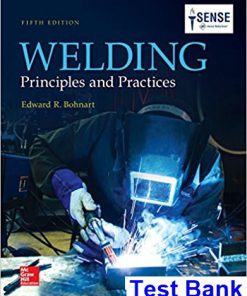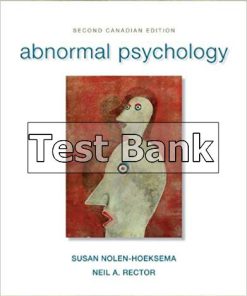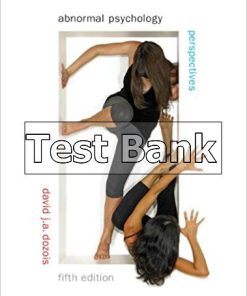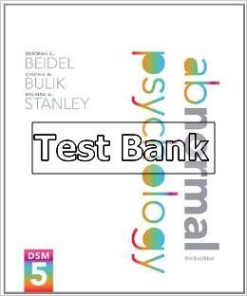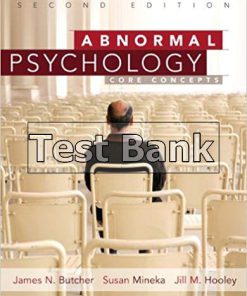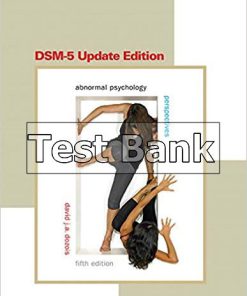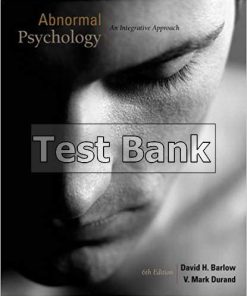Programming Languages Principles and Practices 3rd Edition Louden Test Bank
$26.50$50.00 (-47%)
Programming Languages Principles and Practices 3rd Edition Louden Test Bank.
You may also like
This is completed downloadable of Programming Languages Principles and Practices 3rd Edition Louden Test Bank

Product Details:
- ISBN-10 : 1111529418
- ISBN-13 : 978-1111529413
- Author; Kenneth C. Louden, Kenneth A. Lambert
Kenneth Louden and Kenneth Lambert’s new edition of PROGRAMMING LANGUAGES: PRINCIPLES AND PRACTICE, 3E gives advanced undergraduate students an overview of programming languages through general principles combined with details about many modern languages. Major languages used in this edition include C, C++, Smalltalk, Java, Ada, ML, Haskell, Scheme, and Prolog; many other languages are discussed more briefly. The text also contains extensive coverage of implementation issues, the theoretical foundations of programming languages, and a large number of exercises, making it the perfect bridge to compiler courses and to the theoretical study of programming languages.
Table of Content:
- CHAPTER 1: Introduction
- 1.1 The Origins of Programming Languages
- 1.2 Abstractions in Programming Languages
- 1.3 Computational Paradigms
- 1.4 Language Definition
- 1.5 Language Translation
- 1.6 The Future of Programming Languages
- Exercises
- Notes and References
- CHAPTER 2: Language Design Criteria
- 2.1 Historical Overview
- 2.2 Efficiency
- 2.3 Regularity
- 2.4 Security
- 2.5 Extensibility
- 2.6 C++: An Object-Oriented Extension of C
- 2.7 Python: A General-Purpose Scripting Language
- Exercises
- Notes and References
- CHAPTER 3: Functional Programming
- 3.1 Programs as Functions
- 3.2 Scheme: A Dialect of Lisp
- 3.3 ML: Functional Programming with Static Typing
- 3.4 Delayed Evaluation
- 3.5 Haskell—A Fully Curried Lazy Language with Overloading
- 3.6 The Mathematics of Functional Programming: Lambda Calculus
- Exercises
- Notes and References
- CHAPTER 4: Logic Programming
- 4.1 Logic and Logic Programs
- 4.2 Horn Clauses
- 4.3 Resolution and Unification
- 4.4 The Language Prolog
- 4.5 Problems with Logic Programming
- 4.6 Curry: A Functional Logic Language
- Exercises
- Notes and References
- CHAPTER 5: Object-Oriented Programming
- 5.1 Software Reuse and Independence
- 5.2 Smalltalk
- 5.3 Java
- 5.4 C++
- 5.5 Design Issues in Object-Oriented Languages
- 5.6 Implementation Issues in Object-Oriented Languages
- Exercises
- Notes and References
- CHAPTER 6: Syntax
- 6.1 Lexical Structure of Programming Languages
- 6.2 Context-Free Grammars and BNFs
- 6.3 Parse Trees and Abstract Syntax Trees
- 6.4 Ambiguity, Associativity, and Precedence
- 6.5 EBNFs and Syntax Diagrams
- 6.6 Parsing Techniques and Tools
- 6.7 Lexics vs. Syntax vs. Semantics
- 6.8 Case Study: Building a Syntax Analyzer for TinyAda
- Exercises
- Notes and References
- CHAPTER 7: Basic Semantics
- 7.1 Attributes, Binding, and Semantic Functions
- 7.2 Declarations, Blocks, and Scope
- 7.3 The Symbol Table
- 7.4 Name Resolution and Overloading
- 7.5 Allocation, Lifetimes, and the Environment
- 7.6 Variables and Constants
- 7.7 Aliases, Dangling References, and Garbage
- 7.8 Case Study: Initial Static Semantic Analysis of TinyAda
- Exercises
- Notes and References
- CHAPTER 8: Data Types
- 8.1 Data Types and Type Information
- 8.2 Simple Types
- 8.3 Type Constructors
- 8.4 Type Nomenclature in Sample Languages
- 8.5 Type Equivalence
- 8.6 Type Checking
- 8.7 Type Conversion
- 8.8 Polymorphic Type Checking
- 8.9 Explicit Polymorphism
- 8.10 Case Study: Type Checking in TinyAda
- Exercises
- Notes and References
- CHAPTER 9: Control I—Expressions and Statements
- 9.1 Expressions
- 9.2 Conditional Statements and Guards
- 9.3 Loops and Variations on WHILE
- 9.4 The GOTO Controversy and Loop Exits
- 9.5 Exception Handling
- 9.6 Case Study: Computing the Values of Static Expressions in TinyAda
- Exercises
- Notes and References
- CHAPTER 10: Control II—Procedures and Environments
- 10.1 Procedure Definition and Activation
- 10.2 Procedure Semantics
- 10.3 Parameter-Passing Mechanisms
- 10.4 Procedure Environments, Activations, and Allocation
- 10.5 Dynamic Memory Management
- 10.6 Exception Handling and Environments
- 10.7 Case Study: Processing Parameter Modes in TinyAda
- Exercises
- Notes and References
- CHAPTER 11: Abstract Data Types and Modules
- 11.1 The Algebraic Specification of Abstract Data Types
- 11.2 Abstract Data Type Mechanisms and Modules
- 11.3 Separate Compilation in C, C++ Namespaces, and Java Packages
- 11.4 Ada Packages
- 11.5 Modules in ML
- 11.6 Modules in Earlier Languages
- 11.7 Problems with Abstract Data Type Mechanisms
- 11.8 The Mathematics of Abstract Data Types
- Exercises
- Notes and References
- CHAPTER 12: Formal Semantics
- 12.1 A Sample Small Language
- 12.2 Operational Semantics
- 12.3 Denotational Semantics
- 12.4 Axiomatic Semantics
- 12.5 Proofs of Program Correctness
- Exercises
- Notes and References
- CHAPTER 13: Parallel Programming
- 13.1 Introduction to Parallel Processing
- 13.2 Parallel Processing and Programming Languages
- 13.3 Threads
- 13.4 Semaphores
- 13.5 Monitors
- 13.6 Message Passing
- 13.7 Parallelism in Non-Imperative Languages
- Exercises
- Notes and References
- Bibliography
- Index
People Also Search:
programming languages principles and practices louden
programming languages principles and practices 3rd edition louden
programming languages principles and practices
programming languages principles and practices 3rd edition
programming languages principles and practices 3rd edition download scribd
programming languages principles and practices 3rd edition testbank download pdf





